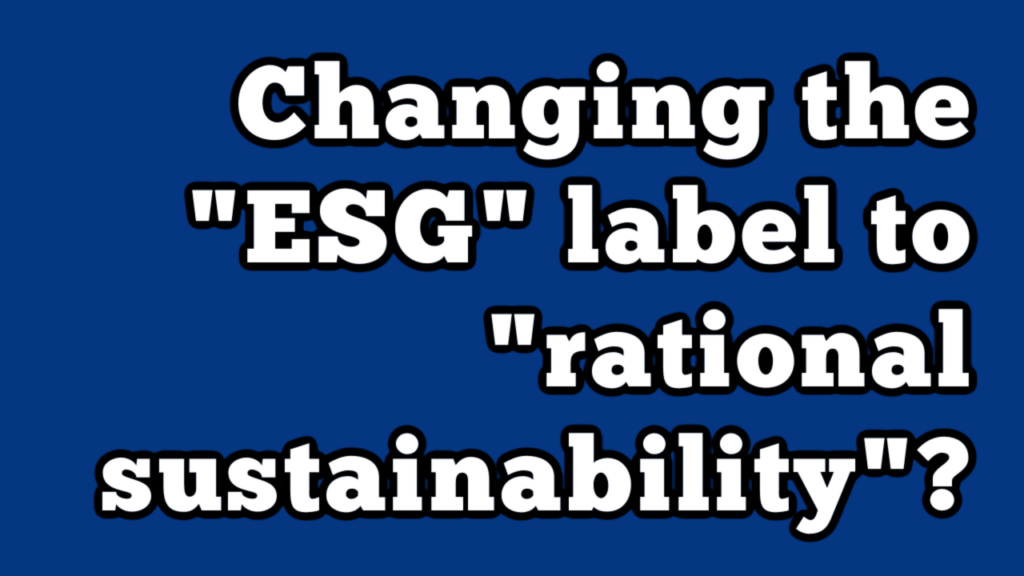Changing the “ESG” label to “rational sustainability”?

Here’s an article from “Bloomberg Green”:
As ESG comes under fire for yet another year, a Morgan Stanley banker-turned-finance professor said it’s finally time to get rid of those deeply divisive three letters.
The ESG moniker has become so politicized that it now prevents clear-headed thinking, said Alex Edmans, who teaches at London Business School. He’s instead proposing the term “rational sustainability.” It may be bland, he said, but sustainability is about producing long-term value—and that’s hard to politicize.“Advocates and critics have become so caught up in cheerleading and criticizing ESG, or scoring points against the other side, that they’ve lost sight of the shared goal to create long-term value,” he wrote in a Jan. 20 paper. He said it’s time to get back to basics and closer to the original intent of those United Nations officials who created the environmental, social and governance movement roughly two decades ago.
“Rational sustainability” considers all factors that create value, regardless of whether they fall under the ESG label, Edmans said. It discounts ESG factors that aren’t material, it’s grounded on evidence and analysis and it focuses on ultimately determining which companies are truly sustainable, he said. In effect, it guards against being caught up in “irrational sustainability bubbles,” Edmans said.
Edmans’ paper comes after investors pulled a record amount of money from US sustainable-investment funds in 2023. In the US, ESG has faced years of intensifying backlash from Republican politicians acting on behalf of the fossil fuel industry, with state lawmakers in New Hampshire even seeking to criminalize the strategy.
BlackRock Inc. Chief Executive Officer Larry Fink, once a loud proponent of ESG, last year said he had stopped using the label because it’s become too politicized. The fact is ESG is “under attack from all sides,” Edmans wrote. ESG started off with much promise and good intentions, but failed because of “true believers implementing it naively, ardent adversaries opposing it blindly and opportunists exploiting it for self-interest,” he said. For most of the past 10 years, asset managers looked at ESG as a way to make money by selling huge numbers of funds and companies used it to court “capital, customers and colleagues by touting their ESG credentials,” he said. And then the political onslaught began.
In his paper, Edmans lays out 10 reasons for using the term rational sustainability. They include its focus on the long term and its emphasis on outcomes rather than labels. Rational sustainability is “about value creation, not politics,” he wrote. It shouldn’t be controversial for anyone regardless of their job titles, political leaning or age, Edmans said. By contrast, ESG is currently perceived as being of interest only to ESG executives, those on the political left and younger people, he said.
Edmans, who also has a Ph.D. in finance from MIT Sloan as a Fulbright Scholar, said he’s critical of how ESG funds attracted money even when it wasn’t justified by their investment performance. Yet he rejects the view that considering ESG factors is inconsistent with fiduciary duty. It’s illogical because careful investment is an essential part of it, he said. “If you’re a pension fund and you’re considering ESG risk, you’re making sure that you aren’t investing in businesses which will go the way of the dodo,” Edmans said in an interview.
